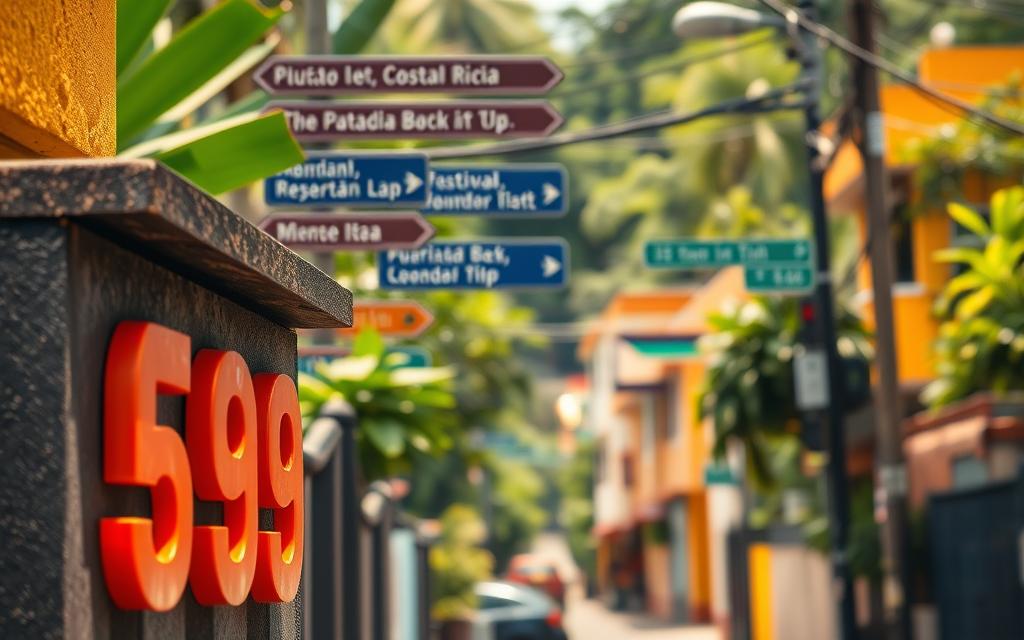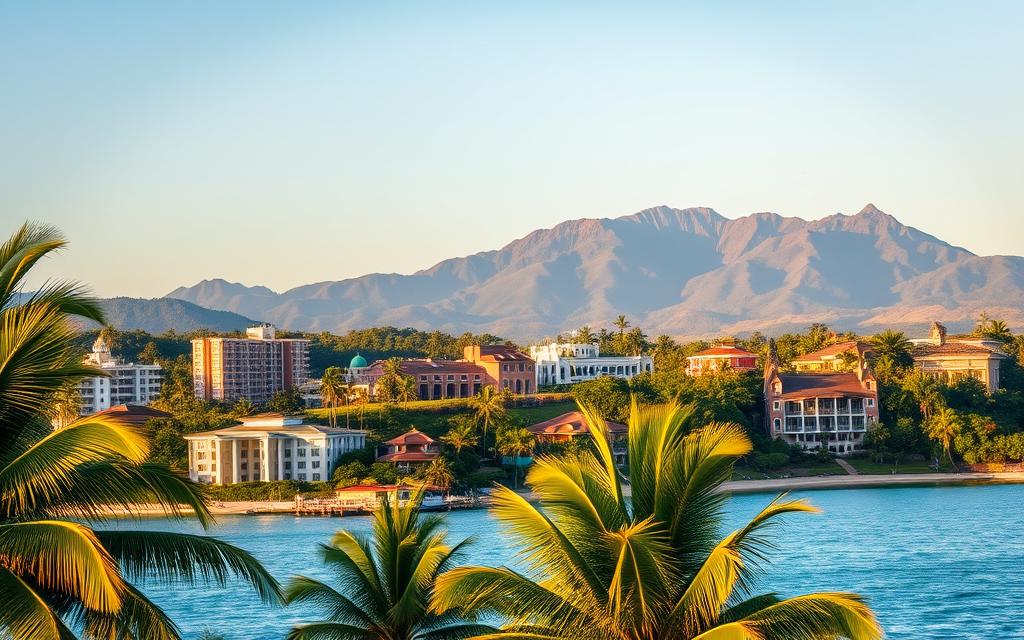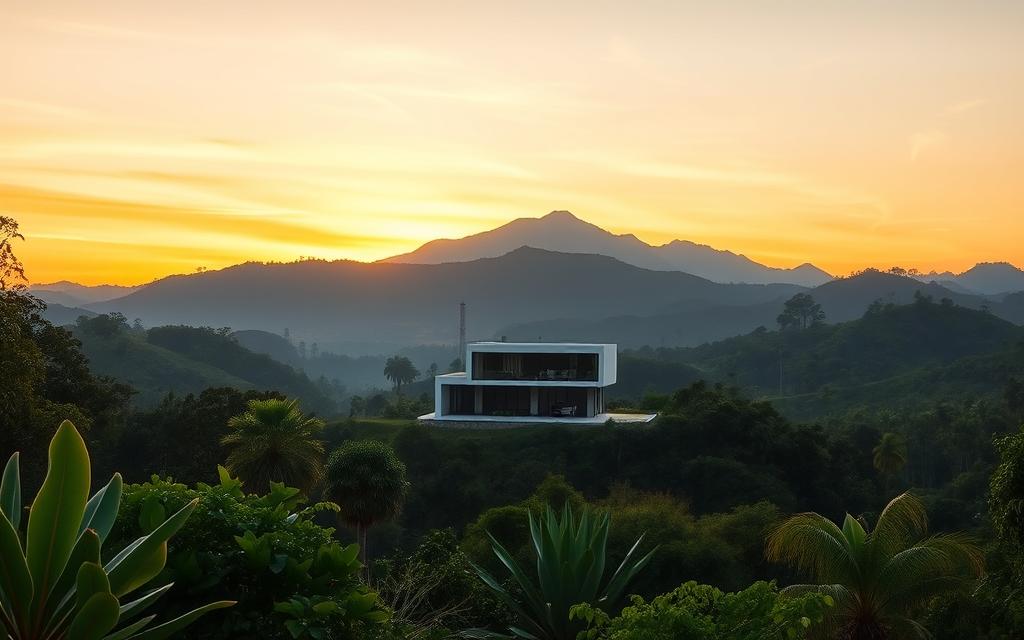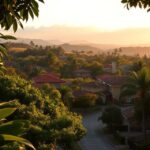Costa Rica Residency: Do I Need a Local Address?

Costa Rica has become a haven for individuals and families seeking a better quality of life and new opportunities. Known for its lush landscapes, pleasant climate, and vibrant culture, this Central American country is a desirable destination for those looking to settle.
Many prospective expats wonder if having a local address is necessary for residency. We will explore this critical question, examining Costa Rica's unique address system and its implications for various residency programs, including Pensionado, Rentista, and Investor categories.
Understanding the legal requirements for address registration is crucial for a smooth relocation process. We'll provide practical insights based on real experiences and official requirements to help navigate this aspect of the residency application process in Costa Rica.
Understanding Costa Rica's Unique Address System

The address system in Costa Rica is unlike many other countries, relying heavily on landmarks rather than street names and numbers. This unique system is a result of the country's historical and cultural development.
How Costa Rican Addresses Work
Costa Rican addresses typically use reference points such as distances from well-known landmarks. For example, an address might be described as "300 meters north and 25 meters east of the former Paco Factory, left side, white wall with a brown gate." This system, while unfamiliar to many foreigners, has its own internal logic that residents quickly adapt to.
The use of landmarks and distances is a hallmark of Costa Rica's addressing system. Instead of conventional street addresses, locals rely on descriptions that often include directions relative to notable features or buildings. For instance, "100 meters south of the church" or "50 meters west of the school" are common ways to describe locations.
The Challenge of Finding and Using Addresses
While the system works well for locals, it can create challenges for newcomers, particularly when filling out official forms that request a conventional address format. Understanding how to properly format and communicate your Costa Rican address is essential for everything from receiving mail to registering for utilities and government services. For more information on the differences between passports and residency identification in Costa Rica, you can visit this resource.
To navigate these challenges, it's helpful to understand that Costa Rica's address system is not just about directions; it's also about understanding the cultural context in which it operates. By familiarizing yourself with this unique system, you can more easily integrate into Costa Rican society and manage the practical aspects of living in the country.
Do I Need a Local Address for Costa Rica Residency?

When applying for Costa Rica residency, one of the most frequently asked questions is whether a local address is mandatory. The answer involves understanding the legal requirements and how addresses are utilized in official documents within Costa Rica.
Legal Requirements for Address Registration
In Costa Rica, the legal framework for address registration is unique and varies by residency category. The Tax office, or Ministerio de Hacienda, is the primary entity where resident registration occurs. On your tax form, you're required to declare your place of residence. However, updates to this information are only necessary at the time of your next tax statement. If you're a property owner, the municipality's oficina de bienes inmuebles will have your property registered, regardless of who the occupants are.
Understanding the legal requirements for address registration is crucial for maintaining compliance as a resident in Costa Rica. The process differs significantly from many other countries, making it essential to familiarize yourself with the local regulations.
How Addresses Are Used in Official Documents
Addresses in Costa Rica play a significant role in various official functions, including tax purposes and voting registration. The government uses address information to keep track of residents for different administrative tasks. As a resident, it's vital to understand how and when to register your address with the relevant government entities to avoid any legal issues.
For a person applying for residency, having a properly registered address can impact the success and legality of your residency status over time. It's also worth noting that different government offices have varying requirements regarding address registration, which can sometimes be confusing for new residents.
Types of Costa Rica Residency Programs

Costa Rica offers a diverse range of residency programs tailored to different needs and circumstances. These programs are designed to attract foreign nationals who can contribute to the country's economy and society. Understanding the different categories and their requirements is essential for choosing the right path for your residency in Costa Rica.
Temporary Residency Options
Costa Rica provides several temporary residency categories, including Pensionado (retiree), Rentista (person with stable income), and Inversionista (investor). The Pensionado category is ideal for retirees who can demonstrate a minimum monthly income from a pension. Rentistas must show a stable income from sources outside Costa Rica. Inversionistas are required to invest in the country, either through real estate, businesses, or other approved investments.
Each of these categories has specific financial requirements and documentation needs. For instance, Pensionados must provide proof of their pension income, while Inversionistas need to document their investment. Understanding these requirements is crucial for a successful application.
Permanent Residency Pathways
Permanent residency in Costa Rica can be achieved through several pathways. One common route is through temporary residency; after maintaining temporary resident status for at least three consecutive years, individuals can apply for permanent residency. Additionally, having a first-degree relative who is a Costa Rican citizen can provide a direct pathway to permanent residency.
Other eligible categories include those who have received status from the Commission on Restricted Visas and Refugees. The application process for permanent residency involves submitting required documents, including proof of address in Costa Rica, and meeting specific eligibility criteria.
The Pensionado Program: Requirements and Benefits

The Pensionado Program in Costa Rica is designed for individuals with a stable pension income, providing them with residency and various incentives. This program is particularly appealing to retirees from countries like the United States, Canada, and Mexico, who are looking for a relaxed lifestyle in a tropical environment.
Financial Requirements
To qualify for the Pensionado Program, applicants must demonstrate a minimum monthly income of $1,000 USD from a pension or retirement fund. This financial requirement is crucial as it ensures that the applicant can support themselves in Costa Rica. The income can be from various sources, including pensions, retirement accounts, or other regular income streams. Proper documentation of this income is essential, typically requiring official statements or letters from the financial institution or government agency responsible for the pension.
Address Documentation Needed
Apart from the financial requirements, Pensionado applicants must also provide proof of address in Costa Rica. This can be in the form of a rental agreement, property deed, or other documents that confirm their residence. The address documentation is vital for the residency application process, as it helps establish the applicant's connection to the country. It's also important to note that maintaining a valid address in Costa Rica is necessary for renewing residency and eventually applying for permanent residency.
By understanding the financial and address requirements, retirees can better navigate the Pensionado Program application process and enjoy the benefits it offers, including tax exemptions on imported household goods and vehicles.
The Rentista Residency Category

For individuals with a stable, non-employment income, Costa Rica's Rentista residency category offers an attractive pathway to residency. This category is designed for those who have a guaranteed income source outside of employment, making it ideal for certain retirees or investors.
Income Requirements and Documentation
The Rentista visa requires applicants to demonstrate a minimum monthly income of $2,500 USD for 24 consecutive months. This financial requirement is a crucial aspect of the application process. To meet this requirement, applicants can use various financial instruments, such as bank deposits or guaranteed income certificates. It's essential to understand the documentation needed to prove income stability, as this will be a key factor in the success of the residency application.
Applicants must provide thorough documentation to support their income claims. This may include bank statements, pension documents, or other relevant financial records. Ensuring that all documents are accurate and comply with the immigration regulations is vital.
Address Verification Process
As part of the Rentista residency application, applicants must also verify their address in Costa Rica. This involves providing proof of residence, which can be achieved through various means, such as utility bills in the applicant's name or a rental agreement. The address verification process is a critical step, as it confirms the applicant's connection to the country.
To learn more about the benefits and challenges of residency in Costa Rica, you can visit this resource for additional insights.
Investor Residency: Requirements and Process
The Investor Residency program in Costa Rica is an attractive option for those looking to invest in the country's thriving economy while securing their residency. This program is particularly appealing to individuals who wish to make significant investments in Costa Rican businesses or real estate.
Investment Thresholds and Documentation
To qualify for the Investor Residency program, applicants must meet a minimum investment threshold of $150,000 USD in an approved Costa Rican business or real estate project. The documentation required includes business registration, tax identification, and financial statements that prove the investment. For more details on the minimum property value for investor residency, visit this resource.
Address Requirements for Business Investors
Business investors must register both their personal and business addresses as part of the residency application process. This involves providing proof of address for both the business location and the investor's personal residence in Costa Rica. Understanding the relationship between the business location, personal residence, and residency requirements is crucial for maintaining compliance with Costa Rican regulations.
Digital Nomad Visa and Address Requirements

Remote workers can now consider Costa Rica as a viable option for their next destination, thanks to its Digital Nomad Visa. This relatively new visa category is designed for digital professionals who can work from anywhere, offering them a chance to experience the rich culture and natural beauty of Costa Rica.
Eligibility and Application Process
To be eligible for the Digital Nomad Visa, applicants must demonstrate a stable income of at least $3,000 USD monthly from sources outside Costa Rica. This requirement is crucial as it ensures that digital nomads can support themselves during their stay. The application process involves submitting proof of income, along with other necessary documents, and complying with the specific address requirements that differ from other residency categories.
Temporary Address Solutions for Digital Nomads
Digital nomads often require flexible housing solutions that can accommodate their mobile lifestyle. Temporary address solutions such as short-term rentals, co-living spaces, and other flexible housing options are particularly suitable. It's essential for digital nomads to understand how to maintain compliance with address requirements while enjoying the mobility that defines their lifestyle.
When selecting accommodations, digital nomads should consider options that will satisfy immigration requirements while supporting their work and lifestyle needs. This might involve choosing places with reliable internet, a community of like-minded individuals, and a location that offers the desired quality of life.
Transitioning from Temporary to Permanent Residency
Costa Rica's residency program allows individuals to apply for permanent residency after maintaining temporary status for a specified duration. This transition is a significant milestone for those who have chosen Costa Rica as their home. We will outline the key aspects of this process, including the timeline, required documentation, and the importance of updating your address information.
Timeline and Process
After three consecutive years of temporary residency, foreign residents become eligible to apply for permanent residency in Costa Rica. The application process involves submitting a written request for a change of category or subcategory, specifying the reasons for the request. This document must be signed in the presence of a public official or notarized by an attorney. For more detailed information on the residency process, you can visit our guide on obtaining residency in Costa.
Updating Your Address Information
Updating your address information is a critical step during the transition from temporary to permanent residency. A stable and documented address history can positively impact your application. It's essential to ensure that your address records are accurate and up-to-date throughout your temporary residency period to facilitate a smoother permanent residency application. Maintaining proper address records can help avoid delays or complications in the application process.
Practical Solutions for Address Requirements
Securing a valid address in Costa Rica is not just a formality; it's a critical component of the residency application. For individuals looking to make Costa Rica their home, understanding the practical aspects of meeting the address requirements is essential.
Renting vs. Buying Property
When it comes to establishing a legal address in Costa Rica, one of the first decisions you'll need to make is whether to rent or buy property. Renting offers flexibility, especially for those who are new to the area or still exploring different neighborhoods. Buying property, on the other hand, can provide stability and is often viewed more favorably by authorities when it comes to verifying your address. Regardless of your choice, ensure that you have a formal agreement that can be used as proof of address.
Using Mail Services and P.O. Boxes
In Costa Rica, traditional mail delivery is not as reliable as in some other countries, making mail services and P.O. boxes essential for receiving important documents. Many expats opt for a P.O. box at the local post office as a reliable address for official correspondence. Additionally, private mail services can offer more flexibility and convenience, especially for those who travel frequently. It's crucial to understand that while these services can provide a verifiable address, they may have different acceptance criteria by official entities.
Understanding the nuances of Costa Rica's address system and the options available for securing a valid address can significantly simplify the residency application process. Whether you're renting, buying, or using mail services, having a clear and verifiable address is key to living in Costa Rica.
Working with Immigration Attorneys

Costa Rica's unique residency requirements often necessitate the guidance of a professional immigration attorney. For those seeking residency in Costa Rica, the process can be complex and daunting. We will explore how working with an experienced immigration attorney can simplify this process.
Benefits of Professional Assistance
Working with experienced immigration attorneys can significantly simplify the residency application process, particularly when it comes to address requirements. These professionals provide access to expert knowledge of current regulations and requirements that may not be clearly documented online. By leveraging their services, individuals can ensure they are well-prepared for the residency application process.
Finding Reputable Legal Help
Finding reputable legal help is crucial, as not all immigration attorneys provide the same level of service or expertise in Costa Rican residency matters. We recommend evaluating potential attorneys based on their experience with address requirements for different residency categories, such as rentista residency or investment residency. Understanding the typical costs and services provided by these attorneys will also help individuals budget appropriately for professional assistance.
By working with a knowledgeable immigration attorney, individuals can navigate Costa Rica's residency services with confidence, ensuring they have the necessary information to answer questions and complete the process successfully.
Common Mistakes to Avoid with Residency Applications
When applying for residency in Costa Rica, several common mistakes can be avoided with proper preparation. Applicants often encounter issues that can lead to delays or even rejection of their application. Understanding these potential pitfalls is crucial for a successful application process.
Address-Related Application Errors
One of the critical aspects of a residency application is providing a valid address. Address-related application errors can lead to significant delays. Common mistakes include insufficient address verification, inconsistent address information across documents, and using temporary addresses inappropriately. To avoid these issues, ensure that your address is consistently reported across all application materials and is verifiable by the relevant authorities.
Documentation Pitfalls
Documentation pitfalls extend beyond address issues and include problems with passport validity, financial proof, and criminal background checks. For instance, a passport must be valid for at least six months beyond the intended stay in Costa Rica. Additionally, financial documents must be up-to-date and meet the specific requirements for the chosen residency category. Ensuring that all documentation is accurate and complete is vital for avoiding unnecessary complications in the application process.
Living in Costa Rica: Beyond Residency
Establishing a life in Costa Rica involves more than just obtaining residency; it requires setting up essential services. As you settle into your new home, you'll need to navigate various aspects of daily life, from utilities to financial services.
Setting Up Utilities with Your Address
To get started with utilities, you'll need to provide your Costa Rican address. This process involves contacting providers for electricity, water, internet, and other essential services. For instance, you'll need to visit the local offices of ICE (Instituto Costarricense de Electricidad) to set up electricity and internet services. Having a valid address is crucial for these registrations.
Banking and Financial Services
Managing finances effectively is crucial for a smooth transition to living in Costa Rica. The country offers various banking options, each with its policies and requirements. To open a bank account, you'll typically need a valid passport, proof of residency, and a local address. Some banks, like Banco de Costa Rica (BCR), offer accounts to non-residents with certain limitations, such as a monthly deposit limit of $1,200 USD. For more information on transferring money to Costa Rica, you can visit this resource.
By setting up utilities and banking services, you'll be well on your way to establishing a comfortable life in Costa Rica. Ensuring that your address is correctly registered with these service providers will help you navigate daily life more effectively.
Healthcare and Insurance Considerations

The healthcare system in Costa Rica is a dual model, offering both public and private services that cater to various needs and budgets. This ensures that every resident has access to reliable healthcare, regardless of their financial situation or personal preferences.
Public vs. Private Healthcare Systems
Costa Rica's public healthcare system, known as Caja Costarricense de Seguro Social (CCSS), is a cornerstone of the country's healthcare. Residents pay a monthly fee ranging from 7% to 11% of their income, which grants access to a wide range of services, including doctor visits, specialist consultations, and major surgeries at a fraction of the costs in countries like the U.S.
The private healthcare system offers additional options, with many facilities and services available, particularly in larger cities. The choice between public and private healthcare can depend on several factors, including personal preference, specific healthcare needs, and budget.
Insurance Requirements for Residents
Insurance requirements for residents in Costa Rica vary by residency category. For many residents, the public healthcare system is mandatory, and the monthly contribution is based on income. For those who qualify, additional private insurance can be purchased to cover services not included in the public system or to access private facilities.
Understanding the insurance requirements and how to use your Costa Rican address for healthcare registration and insurance claims is essential for accessing medical services efficiently. We will provide practical advice on selecting healthcare providers and insurance options based on your location and specific needs as a resident.
Conclusion
Embracing the Pura Vida lifestyle in Costa Rica starts with understanding the role of a local address in residency applications. Throughout this article, we've explored the essential information about Costa Rica's unique address system and its relation to various residency programs.
The key takeaway is that while a local address is necessary for residency applications, Costa Rica's addressing conventions offer more flexibility compared to many other countries. Understanding the specific address requirements for your chosen residency category is crucial for a successful application and a smooth transition to life in Costa Rica.
To navigate these requirements effectively, we recommend working with experienced professionals who are well-versed in Costa Rica's residency process. For personalized assistance with your residency application and address-related queries, you can contact JAROS CR at info@jaroscr.com or +(506)7182-8969. Additional resources and information about establishing residency in Costa Rica are available on their website, www.jaroscr.com.
As you embark on your journey to residency in Costa Rica, remember that the country's unique address system is just one aspect of the rich cultural experience that makes living in Costa Rica so unique and rewarding. With the right guidance and information, you can successfully navigate the process and enjoy all that Costa Rica has to offer.


